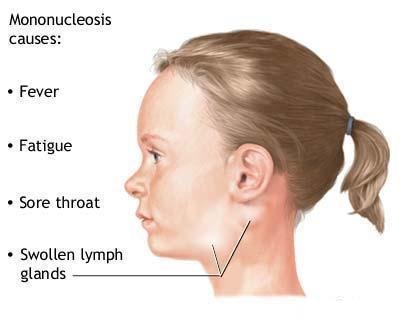
The American Academy of Pediatrics advises parents to call a doctor if your child is extremely fussy or drowsy, has a severe headache or sore throat, develops a rash, has a seizure or temperature of 104° Fahrenheit or above. Less common but serious symptoms are swelling of the liver causing jaundice or swelling of the spleen (an organ in the upper left part of the belly) causing pain in the upper left part of the abdomen.About half of those with mono have enlargement of the spleen sometime during their illness. Swollen lymph nodes in the neck, groin, armpit.Very sore throat (including white patches in the back of the throat).If symptoms linger or get worse, call your doctor. When symptoms appear, they may be severe for a few days before slowly get milder. Symptoms may come on gradually about 4-6 weeks after someone is infected with the virus. Even with absent or minimal symptoms, the virus could still be carried in the saliva and be passed to others. Mono is sometimes mistaken for the common cold, the flu or strep throat.

Teens and young adults (ages 15-24) are most likely to have noticeable, classic mono symptoms that also tend to be more severe, while babies and young children often have no symptoms or very mild ones. Symptoms of mono vary between age groups. You can pass the virus to others through your saliva for a median duration of six months after symptoms subside. Still, anyone can get mono, including babies and young children. That’s why we hear a lot about it in teens and college students. Less commonly, the virus is spread through breast milk, sexual intercourse and blood transfusions. The virus also spreads from coughing, sneezing and sharing a straw, drinking glass, eating utensil or toothbrush. Nicknamed the “kissing disease,” mono is spread through close contact, particularly contact with the saliva or mucus of an infected person. Mono is not as easy to catch as a common cold. When this happens, it’s possible to pass it on to others who haven’t already been exposed, even if you don’t have symptoms. It’s mostly inactive, but sometimes the dormant virus reactivates and is shed in the saliva and other bodily fluids.

Once infected, EBV stays in the body for life. Most people are infected with EBV at some point in their lives, often by middle adulthood. Other infections that can cause mono include rubella, hepatitis, adenovirus, cytomegalovirus, toxoplasmosis or HIV. Could it be mononucleosis (mono)?Ī common and contagious viral infection, mono is usually caused by the Epstein-Barr virus (EBV). Hey, no one said mono was fun.Your child has the telltale signs: extreme fatigue, swollen lymph nodes and a sore throat. So make sure to let your teachers know what's going on so they can be more understanding about your workload and responsibilities in class, skip after school activities and sports practice, and stay in at night. Mono can linger for about a month, and your best defense is plenty of rest and lots of fluids to give your body the best chance of fighting off the infection. It'll go away on its own, just like a cold, but it will probably take a little longer than you'd like.

Hence the virus's popularity at colleges-close quarters give you all the more opportunity to get sick. Even reaching into a communal bowl of chips can lead to trouble. Now that you feel absolutely awful, who can you be mad at for getting you this way?ĭespite the whole "kissing disease" thing, you can catch mono just by drinking from another person's glass, using their fork, and getting coughed or sneezed on by someone who has it. But while there's no cure for mono, these side effects can often be taken care of with antibiotics as well as over-the-counter medicine. And if that doesn't sound exciting enough, you're also incredibly susceptible to getting the painful bacterial infection strep throat. You'll likely get a sore throat, stuffy nose, swollen glands, headache, and fever. Your body's got to handle that on its own. Unfortunately, because mono is a viral infection (like the common cold) and not a bacterial infection (like pink eye), there isn't any medication your doc can prescribe to make it go away. These can sometimes lead to a false negative, so if your results are clean but you still feel crappy a week later, your doctor may want to do a more extensive test where they draw blood and look for Epstein-Barr virus antibodies-a sure sign that your body is battling the virus.

Your doctor can do something called a monospot test where they prick your finger and analyze a drop of blood within a few minutes.


 0 kommentar(er)
0 kommentar(er)
